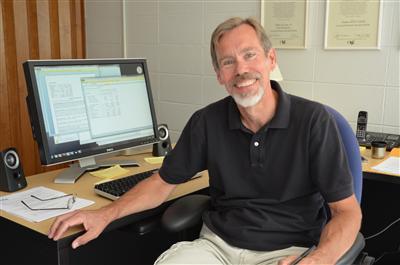
Credit: John Karl, WRI
June 29, 2011
By Aaron R. Conklin
Chances are good you’ve never seen him or even heard his name. But without Dan Marklein’s experience and expertise, none of the research projects currently supported by University of Wisconsin Water Resources Institute (WRI) would ever have gotten off the ground.
The text on Marklein’s business card is something of a mouthful. It reads, “finance and grants administrator/information technology manager.” In very real terms, he’s the man who manages the grants WRI administers to its principal investigators each biennium. Marklein shepherds each grant proposal through the often byzantine process of submission, review and approval. Now, after 37 years, Marklein is stepping away from the spreadsheets and contracts to pursue his next chapter—his retirement from becomes official this week.
It’s been a rewarding ride for Markelin, 57, who was recruited to the organization as a green 20-year-old back in 1974. His title back then was “clerical bookkeeper/account examiner.”
It didn’t take him long to expand his horizons. Soon, he was using his new-found knowledge in ways he hadn’t expected, both to oversee the organization’s budget and to educate grant-seekers.
“When you’ve done this as long as I have, you become familiar with the practical side of the grant process.” said Marklein. “You become more flexible. You learn to be able to anticipate possibilities and warn grant-seekers about potential pitfalls. Watching these grants come to fruition, allowing the research to commence and students to get supported, that’s been the most rewarding part of my job.”
Marklein also played a major role in WRI’s technological development. Back in the early 1980s, he was the first WRI employee to begin using a personal computer—a bright and shiny dual-floppy IBM-PC — to log and track the grant-approval process. Within a few years, he oversaw the migration of the entire process to an electronic platform, where it has since flourished: Today, WRI has its own proprietary software package that applicants and grant recipients use to submit applications and report research activity.
In 1988, Marklein was lured up the UW division-level food chain, taking a job with the Nelson Institute of Environmental Studies. Two years later, hisold position came open again, and Mary Lou Reeb, the organization’s assistant director, called him up to see if he’d consider returning.
She didn’t have to hard-sell it.
“I jumped on it, it’s true,” said Marklein. “The work I was doing at that point wasn’t as rewarding—I was just rubber-stamping the grant work others had done.”
Like the rest of the staff, Reeb was thrilled to have Marklein back.
“In all my years of working, I have never met a more dedicated person than Dan for going the extra mile for the program,” said Reeb. “He is a 24/7 guy, available whenever and for as long as necessary. To say that he is irreplaceable is simply an understatement.”
Marklein has compiled a list of impressive accomplishment. But his proudest came in the mid-90s, when he spearheaded the training of educators in the use of the Internet as part of the international JASON Project, an initiative of WRI’s sister program, Sea Grant. Founded by Titanic discoverer Bob Ballard, JASON was designed to excite and engage middle-school students and their teachers in marine science and technology.
“During the twelve years that Wisconsin Sea Grant hosted Madison JASON, there were 500 Wisconsin teachers and 22,000 students who would have given Dan an A+ for helping them enter the digital age,” quipped Reeb, who led the Madison JASON project.
Now that he’s leaving the Sea Grant world, Marklein plans to spend his newfound free time with his grandchildren, and also to pursue his dream of becoming a craft brewmaster.
“I’ve worked with a ton of great people,” said Marklein. “This job brings you in touch with so many interesting things.”



